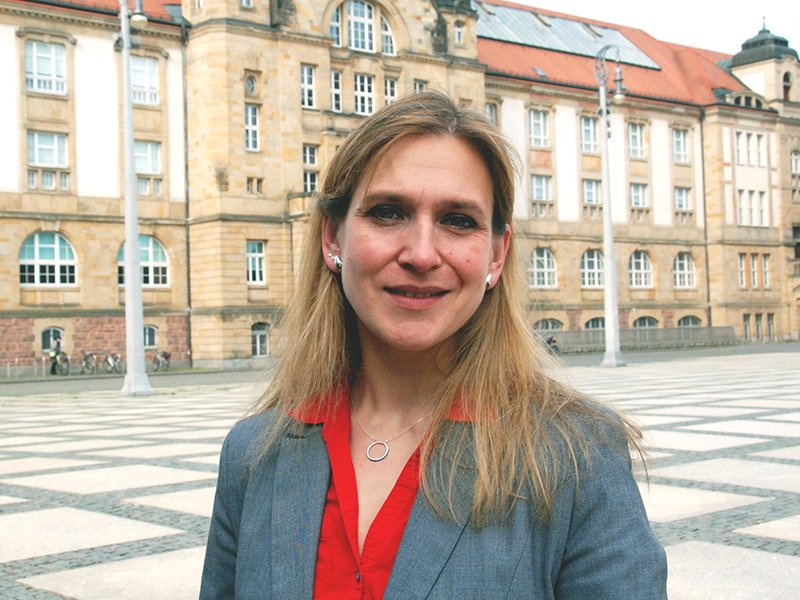“New Communication Technologies and Media Enable Enhanced Cultural Transfer”
Eleven Questions for Jun. Prof. Dr. Gala Rebane, who has held the Junior Professorship of Intercultural Competence since February 2016
-

For Jun. Prof. Dr. Gala Rebane, a visit to the City Art Museum is a “must” when friends, acquaintances and colleagues visit her in Chemnitz. Photo: Mario Steinebach
Jun. Prof. Dr. Gala Rebane (38) has held the Junior Professorship of Intercultural Competence in the Faculty of Humanities since February 2016. In eleven answers, she gives “University News” readers a glimpse into her background, her goals and her time in Chemnitz.
What does it mean to specialize in Intercultural Competence?
New communication technologies and media enable enhanced cultural transfer and provide for the creation of new kinds of identification patterns and cultural spaces. We refer to these kinds of cultural exchange processes that operate in cyberspace and are not bound to a single location as “transnational relationships”, and they can lead to an amalgamation and hybridization of culture forms.
The TU Chemnitz is the right choice for me as a professor, because…
…here people enjoy a large degree of freedom in research and don’t have to stay within the borders of their own subject area. Rather, it is possible to initiate collaborations with colleagues from various other disciplines. And the students are also very interested and open-minded when it comes to new questions or problems.
Can you tell us a bit about your academic career so far?
After a couple of semesters of Art History and Art Expertise, I studied Romance Philology with an emphasis in Italian Studies at the University of St. Petersburg and Siena. Then I taught foreign languages for a few years, completed my doctorate in Intercultural Communications and afterwards I worked for five years in the Department of Social Psychology at the Ruhr-Universität Bochum. It may not seem like it at first glance, but believe me: it is all very closely connected.
Describe your years of study in only a few words.
I see life as an open-ended learning process, so my years of study continue on.
Did you have role models during your studies who encouraged you to pursue a scientific career?
First of all, my father and my grandparents, who showed me that science is neither job nor career, but rather a vocation in the truest sense of the word: one must really live it – or not begin at all. Additionally, I owe a lot to our Italian instructor. Above all else, his merciless irony, which taught me that as a scientist, you have to be willing to fully stand behind everything you say and write.
Do you have any advice for young students and graduates?
Optimistic skepticism as a basic approach, which Polish philosopher Stanisław Jerzy Lec aptly put in a nutshell: “In reality, everything looks different from what it really is.”
What would you like to achieve in your teachings in the future?
It is important to me to encourage students to think critically and independently. I am always happy when my words are called into question, because we can learn a lot from one another in the discussions and we can arrive at important insights together.
What impact does your research have at the TU Chemnitz?
At the moment, I am researching the life-worlds of bicultural young people and the role that digital communication technologies play in the development of their identities. Beyond that, I also have a few other favorite projects that I am keeping on the back burner: digitally supported self-optimization practices, bicultural relationships, the reception of history in historical novels – I guess I have remained a philologist at heart.
There are around 45,000 professors at German universities. What distinguishes you from all others?
If need be, then I’d have to place my bets on the buskin boots of ancient Greek actors.
What is your favorite place to show guests in Chemnitz?
The determining factors are, of course, the purpose and duration of the visit. But you always have to go to the Art Museum. The Kassberg with its gorgeous old art nouveau style buildings is definitely on the agenda, too. And I also like to walk through the Crimmitschauer Forest.
How do you play a part in the life of the city?
Beside the rise in the population count? The question of cultural inclusion has reached an unprecedented level of explosiveness in our society; in this context, the issues that the fields of Intercultural Communication and Competence deal with are of considerable significance. Perhaps we can back this up with results from a research project about international students, which we will carry out in the next few years in cooperation with the STEM faculties.
(Translation: Sarah Wilson)
Katharina Thehos
06.06.2016





